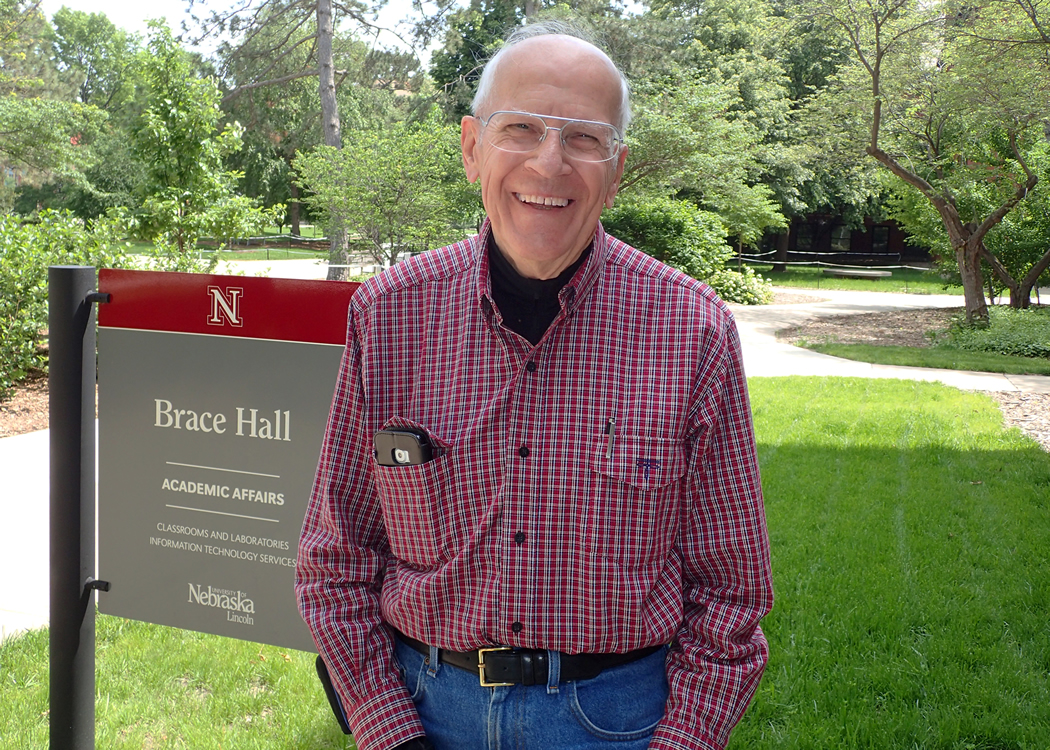
Loyd D. Jacobs of Bellevue, WA, passed away on March 9, 2017. He received his MS in Physics in 1958 from the University of Nebraska–Lincoln. Jacobs was a longtime, passionate supporter of the Department of Physics through the Ted Jorgensen Fund for Physics, named after his renowned instructor, mentor and friend.
Born on November 22, 1932, Jacobs grew up in Kansas where he lived for most of his childhood in Lamont or Emporia. He attended Emporia High School and Emporia State University where he majored in physics, math and chemistry and served as a physics lab instructor. He received his BA with honors in 1954, and from there he came to Nebraska for graduate study and research in physics and math.
After receiving his degrees, Jacobs was employed by the Boeing Company first in Wichita in 1957 and from 1962 until his 1995 retirement in Seattle, WA. He specialized in the areas of noise engineering, structural dynamics, vibration and loads on both military and commercial aircraft. Following his retirement, he greatly enjoyed creating and designing a magnificent garden, pursuing extensive travel, and the joys of photography.
Jacobs was preceded in death by his wife Barbara (“Bobbie”) who he met at Nebraska when she was a secretary in the department, and by his son, John. He is survived by his children – Paul and Ann – and close companion Sue Olsen, with whom he visited Lincoln and toured campus several months prior to his passing.
“Loyd was truly inspirational,” Joseph S. Francisco, dean of the College of Arts and Sciences, reflects. “He represented to me how to really see the beauty of life, the robustness of relationships, and the value of people. We are so grateful to have known him, and for his ardent support over the years.”
“I first met Loyd when he attended the May 2003 reunion of students who worked in Ted Jorgensen’s accelerator lab in the middle 1950s to late 1960s,” Emeritus Professor Roger Kirby recalls. “These students had formed close bonds and were delighted to renew old friendships.”
As department chair at the time, Dr. Kirby and his wife Sue hosted a party for the visiting alumni at their home. “Loyd and his wife Barbara both attended, and Sue remembers that they brought us a package of dried Washington cherries as a gift – they were fantastic.” The couples’ friendship blossomed over the years, with reunions occurring each time the Jacobs’ travels brought them through Lincoln.
Dr. Kirby recalls his conversation with Jacobs following the death of Dr. Jorgensen, who passed away at the age of 100 on April 4, 2006. “I spoke with him over the phone, and he was astounded that no one had yet established an NU Foundation account in Ted’s name,” Dr. Kirby recalls.
Without hesitation, the Jacobs’ established the Ted Jorgensen Fund for Physics with a substantial donation. Jacobs’ fellow alumni and peers, department faculty, Jorgensen relatives and others soon donated enough that the fund became endowed. Jacobs would continue to make generous contributions up until his passing, and his companion Sue Olsen recently honored him with a gift to the fund in his memory. Income from this fund provides scholarships for deserving physics students each year, providing a lasting legacy.
“Loyd had many, many good qualities,” Dr. Kirby reflects. “But one thing especially stands out to me: He remembered from where he came and the debts he had to those who helped him reach his goals. He greatly appreciated the educational opportunities he received, and he recognized that what he learned and achieved through hard work enabled his later successes. He was a great and loyal friend to the department, and I will miss him greatly.”
“Loyd's contributions have had an enormous impact,” Dan Claes, chair of the Department of Physics and Astronomy, agrees. “By establishing and endowing the Ted Jorgensen Fund, he has helped us provide fellowships to attract excellent graduate students into our program, and stipends for a number of incoming graduate students.”
Dr. Claes adds that, each year, these stipends enable students to attend a summer "bridging program" – offered to the admitted students in need of making up a few deficiencies in their undergraduate preparations. Funds also have been used to assist outstanding undergraduate students struggling to meet tuition costs and to sponsor prominent scientists to come speak to students about their work.
“The fact that Loyd did this all in Ted's name – note this isn't the 'Loyd Jacobs Fund’ – wanting to honor an instructor he thought so highly of, speaks volumes to his generosity,” Dr. Claes reflects.
Written by Sophia Werning